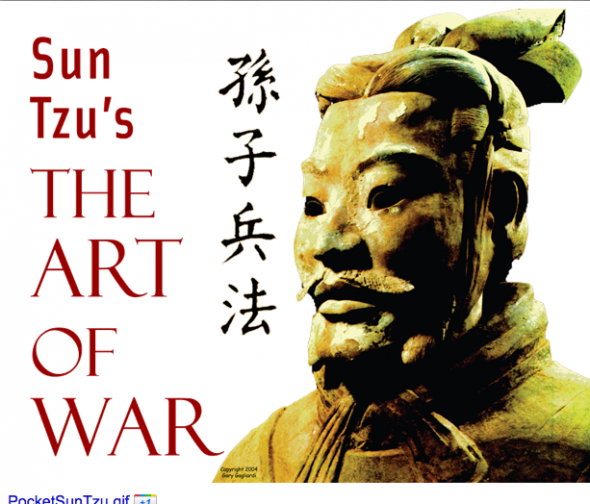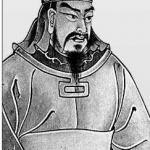The Art of War is a battlefield manual written by Chinese general Sun Tzu (孙子, also spelled “Sun Zi”) around 300 B.C. It is difficult to summarize, because it is essentially a book of success tips not unlike what we now see populating the bestseller’s list.
Point is, I’m not trying to summarize the book as a whole, because it doesn’t lend itself to being summed up, and not all of it applies to present day. What we can do? Look at how each of us can interpret The Art of War in ways that complement our vision of servant-leadership.

Sun Tzu begins by establishing “five constant factors” that govern the art of war. But more generally, he is saying these factors should be taken into account in every decision that involves . Like the rest of The Art of War, the ideas are expressed in formal language informed by Taoist imagery. At first it seems confusing, but actually it can help us divorce the ideals of leadership in Art of War from the context of ancient war strategy.
For example, here are Sun Tzu’s “five constant factors” [original wording in bold] translated into modern day English as advice for leaders and managers of today:
1) “The Moral Law” = Determine goals, and just as important, why those are the goals, then determine what kind of workplace culture or “moral law” is necessary to achieve those goals
2) “Heaven” = Read outside factors and influences – which might hurt or help your chances of achieving these goals.
3) “Earth” = Develop a “real-world” game plan to navigate your vision through the circumstances it faces, good or bad.
4) “The Commander” = That’s you, whether you like it or not. Sun Tzu’s list of great leadership traits is timeless: Be sincere, be kind, be courageous, be wise – but lay down the law when you have to.
5) “Method and Discipline”= Surround yourself with a team you respect, and that respects you. Just as important, make sure the infrastructure is in place for everyone to communicate and get things done efficiently.
Many other people have adopted Sun Tzu’s battle manual in other ways: to business management and personal success, even things like computer programming, library administration, and liberal arts lesson-planning. That’s the beauty of an interpretative leadership text: It can have a different impact on different people, depending on the context.

But should we really be taking servant-leadership advice from one of the most calculating warriors in history? There are certainly fables about Sun Tzu that would suggest NO. To select one: It is said that when the King asked Sun Tzu for advice on how to turn his concubines into warriors, Sun Tzu simply executed the King’s two favorite ladies. They were too distracting to his duties. The rest, terrified, agreed to rigorous training in  martial arts. Even the King didn’t ask questions.
martial arts. Even the King didn’t ask questions.
So…yeah. Things like this might make us shy away from using Art of War as a way to develop our own personal leadership skills and mentality. But don’t be scared! Remember: Read it like a metaphor, or better yet, like a book of general philosophy. Don’t worry about the sections where Sun Tzu tells you how to best equip chariots to ravage the Chinese countryside. Those sections don’t apply to you (I hope…) After all, many thought-leaders of the 21st Century, including Pat Benatar, have used “the battlefield” as a metaphor for other aspects of modern life. And if she can do it, so can we!
So, to finish off this post, let’s look at how a few original lines from Art of War can inform our service leadership in 2011 and beyond.
Attack him where he is unprepared, appear where you are not expected. (Chapter I, line 24)
Meaning: Don’t look for solution in the same places everyone else is. Lead your team to untapped niches in the market, or to unsolved problems in society.
What the ancients called a clever fighter is one who not only wins, but excels in winning with ease. Hence his victories bring him neither reputation for wisdom nor credit for courage. (Chapter IV, lines 11-12)
This is more of a personal success tip. Don’t enter a challenge with the mindset, “Will I succeed or not?” Instead, think “How will I succeed?” Doing things well is your job, your duty to others. So when you succeed, don’t brag about it!! You’re just doing your job, your duty as a leader to those who follow you.
Maneuvering with an army is advantageous; with an undisciplined multitude, most dangerous. (Chapter VII, line 5)
Before you “lead your team” anywhere, you need to make sure everyone is on the same page. This is basically a lesson in communication + organization. Sun Tzu also believed in mutual trust between officer and soldier as the one of the most important of a strong  army. Same with an organization. First priority is always team-building. After your team is strong, united, and communicative: Then act.
army. Same with an organization. First priority is always team-building. After your team is strong, united, and communicative: Then act.
Another trait of the ideal servant-leader we have discussed in the seminar is that he or she should be an inspiration to everyone else in the organization. Sun Tzu concurs:
“The principle on which to manage an army is to set up one standard of courage which all must reach” (Chapter XI, line 32).

These are by no means the only things to be learned from Art of War, but by now you should want to read the classic. Yourself. Even Paris Hilton’s doing it!
